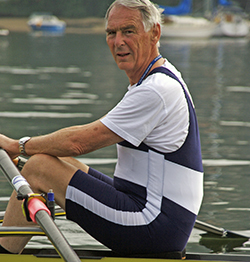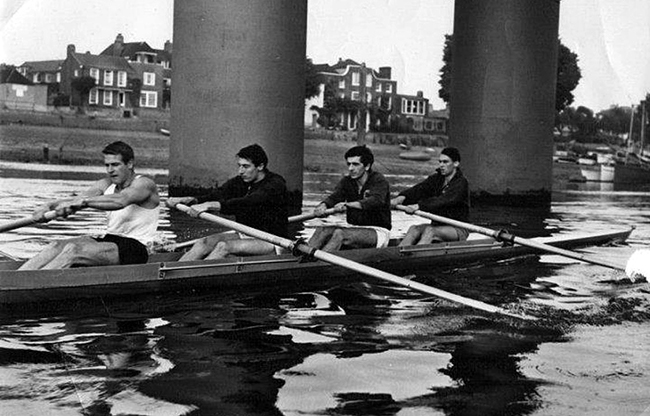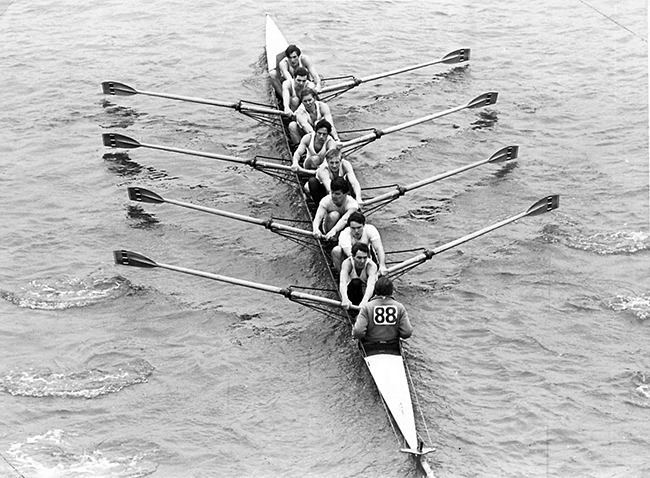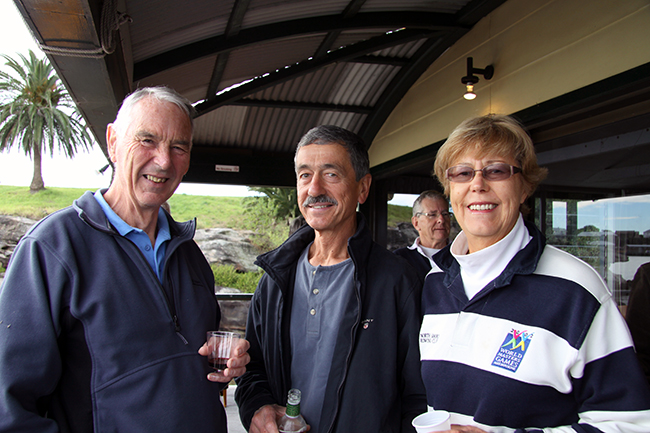John J James OAM

London University (UK), Tideway Scullers (UK), Thames Rowing Club (UK) and North Shore Rowing Club (NSW)
The following was written by Sue Wannan in 2007 for the 2007 Australian Masters Regatta program.
John James has been a rower for 66 years. His first attempt was as a four-year-old. He apparently rowed across a lake, got to the other side but couldn’t get back. He’s improved a bit since then.
He’s rowed for school, for London University, and for Great Britain. He’s won more races than he cares to count (he’s not the sort of bloke who keeps count), including a silver medal at the 1964 Tokyo Olympics as bow in a coxless four.
These days he’s competitor, coach and mentor, and has held positions on club, state and national rowing organisations. In both experience and success, he’s up there. Not that he’d tell you that either. He’s not that sort of bloke.
The question “what’s been the best, the highest point of rowing, for you” draws an immediate, quizzical “Beating the Ellercamps?”, then a thoughtful pause. “I like moving a boat efficiently in sync with the rest of the crew. When you know you’ve got it right.”
And the worst? “Having a collision on the Thames in a single scull in the middle of winter. The boat sank. I had to swim to the bank and run home. It was freezing.”
John learnt to row as a schoolboy, when fours had fixed seats, a 10cm-wide plank that ran across the boat. Rowers were able to get some slide, but it was bottom across wood, and metho was an invaluable adjunct. It does, he says, teach you a long reach, and to use your back as well as legs.
In the early 1960s, while attending London School of Economics, a college of London University, he was stroke of the eight which won the Thames Cup at Henley Royal Regatta, the first time London University had ever won. The same year he went to the European Championships in Prague in a coxed four. “We didn’t do well, but it was my first taste of international representation.”
By 1964, John, now an articled clerk working full time for a London accounting firm, was involved with The Tideway Scullers, these days said to be Britain’s leading sculling club. Tideway Scullers, then in its infancy, was proving its theory that scullers make better rowers by having its eights (including John James) dominate the Head of the River on the Thames for several years
“I still believe scullers make better rowers. If you’re a boat mover, you’re a boat mover. There’s too much emphasis on ergs and strength above the ability to move the boat.”
In the same year John was selected for Great Britain’s Olympic rowing team. The final crew for the coxless four was settled only two months before the Tokyo races and never had the opportunity to race together before the Olympics. “We had no idea how fast we were.”
Olympic rowing had its surprises. Like finding a hole in their boat when they unloaded it in Japan (they filled and polished it; John is still a good filler and polisher.) And at a point two-thirds of the way through the semi-final when John noticed that the three seat’s gate was open. “We just rowed very smoothly.”
Bad weather forced the Olympic final to be postponed for two hours. “We thought this was probably a slight advantage. If the East Europeans were on drugs, their timing would now be off.” The Danes won, Great Britain second, USA third. West Germany who’d won the European Championships two months earlier, came 4th.
One month after returning from the Olympics, John sat and passed his final accountancy examinations. But it was time for a change. In 1969 he emigrated to Australia and in 1976 joined North Shore Rowing Club. For the next 20 years he was a weekend rower and a sailor in Lasers and offshore races.
“I competed at one North Shore regatta and nearly killed myself. It’s difficult not to row hard even if you’re unfit. One of the race officials saw me on the pontoon afterwards, looking ashen faced and slightly stricken, and shook his head: ‘You bloody fool’”.
However the promise of rowing in the 1997 World Masters rowing in Adelaide with an English mate who’d said “only if you’re fit” got him back into training. Today it’s a rare masters regatta he doesn’t leave with medals.
But he also devotes time and energy to his sport. He’s boat master at North Shore, has been on the Competition Committee at NSW Rowing and is still a NSW representative on Rowing Australia’s Masters Commission. He also coaches, as he has done since he was a schoolboy.
“Coaching helps you to work out your own technique. Seeing what they do wrong helps you to correct yourself. Coaching makes you think about rowing.
“Rowing is a thinking sport every bit as much as a physical one. I take great delight in taking a length off somebody by reading the changing conditions as we go round a corner more quickly than they do.
“I also believe in technique over brute force. I have to – I’m not six foot six and 100kg with the strength of a gorilla and so have to rely on technique and guile.”
What do you like about rowing? “Communing with nature – early morning or late afternoon, seeing trees and birds, and nice calm water is enormously satisfying. It’s every bit as good as a religious experience.
Aims for the future? John Jesse James, now 70, would like FISA to follow NSW Rowing’s lead and introduce J class races (J = 80+). He fancies the symmetry of JJJ rowing as a J.
Sue Wannan, 2007
[Editor: Past Secretary of the Head of the River regatta, Dr Andrew Ruddle has kindly added that Tideway Scullers won HORR from 1964 to 1972 inclusive and that the race in 2009 was also won by TSS; they marked their 50th anniversary by putting together a crew made up of the finalists from the 2008 Olympic singles.]

Training for the 1964 Olympic Games passing under Barnes Railway Bridge
Stroke John Russell, Hugh Wardell-Yerburgh at 3 (killed in a car accident aged 32 in 1970), 2 Bill Barry, (son of Lou Barry, famous Tideway Scullers and Cambridge coach), John James at bow.
Photo acknowledgement - Ollie Goodley - Own work, CC BY-SA 4.0, https://commons.wikimedia.org/w/index.php?curid=75982466

1969 Thames V crew in the Head of the River with John in the stroke seat
Image details provided by Dr Andrew Ruddle
Some details:
1955 - Henley Regatta: Princess Elizabeth Cup -Second
1961 - Henley Regatta: Thames Cup, London University - First
1961 - European Championships in Prague Coxed Four – UK
1964 - Henley Regatta: Stewards Cup - First
1964 - Tokyo Olympics: Coxless Fours (UK) – Silver
1965 - Henley Regatta: Stewards Cup –First
1998 to 2011 Attended and raced at FISA Masters regattas in Adelaide, Seville, Munich, Vichy, Hamburg, Ballarat, Scotland, Poznan, Dunedin & Czech Republic
2021 - Awarded a Medal of the Order of Australia for services to rowing
Member of the RNSW Race Committee for about 3 years
Member of RNSW Masters Selection Committee for 4 years
Member of RA Masters committee & of the programme subcommittee

John James, Phil Titterton and Linda McDonald
His citation for his Australian Honour in 2021 Queen's Birthday Honour List was as follows.
For service to rowing.
North Shore Rowing Club
- Treasurer, 2000-2019.
- Member, since 1975.
- Life Member, 2007.
Rowing Australia
- New South Wales Delegate, Masters Commission, 2003-2011.
- Commissioner, Masters Commission, 2003-2011.
- Member, Organising Committee, Australian Masters Championship Regattas, 2004 and 2008.
Rowing New South Wales
- Commissioner, Competition Commission Masters Sub-Committee, 2006-2012.
- State Masters Selector, 2007-2011.
HumanLogic
- Former Volunteer.
Awards and recognition include:
- New South Wales Masters Rower of the Year, New South Wales Union of Rowers, 2018.
- 50 years of Meritorious and Commendable Service to the Sport of Rowing, New South Wales Union of Rowers, 2006.
Andrew Guerin
Updated November 2024
Sources:
- 2007 Australian Masters Regatta program story by Susan Wannan
- Information and images provided by Owen Nix, Rowing NSW
- https://honours.pmc.gov.au/honours/awards/2009463 extracted 21st January 2022
- UK photos brought to our attention thanks to fellow Thames rower Stephen Wise
- Email from Dr Andrew Ruddle in November 2024 identifying the image of the 1969 Thames crew and some more interesting information on the Head of the River.

